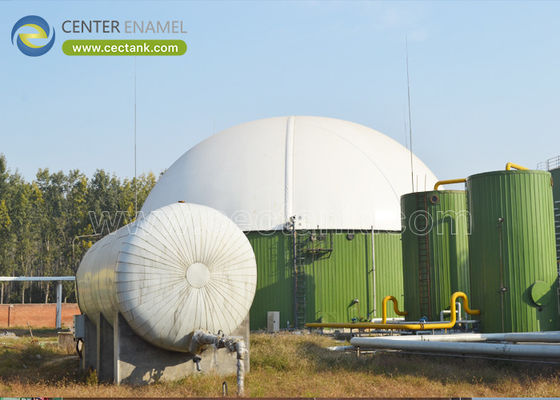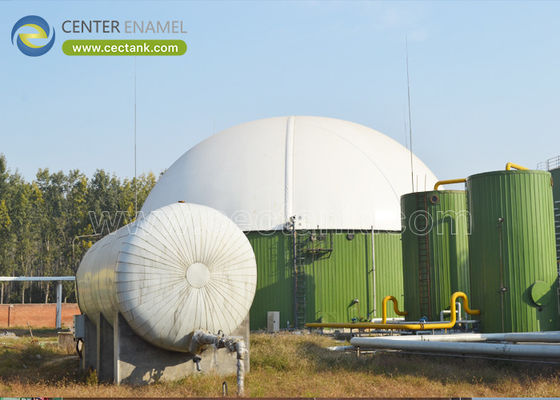-
Glass Fused To Steel Tanks (465)
-
Stainless Steel Tanks (434)
-
Fusion Bonded Epoxy Tanks (469)
-
Galvanized Steel Tanks (321)
-
Aluminum Dome Roofs (1257)
-
Wastewater Storage Tanks (226)
-
Welded Steel Tanks (457)
-
Pressure Vessels (295)
-
Anaerobic Digester (201)
-
Industrial Water Tanks (349)
-
Glass Lined Steel Tanks (180)
-
Bolted Steel Tanks (270)
-
Sludge Storage Tank (115)
-
Biogas Storage Tank (173)
-
Leachate Storage Tanks (133)
-
Agricultural Water Storage Tanks (179)
-
Fire Water Tank (166)
-
Grain Storage Silos (146)
-
Biogas Projects (381)
-
Wastewater Treatment Projects (270)
-
Double Membrane Roof (223)
Low Maintenance Costs of GFS Anaerobic Digestion Tanks: The Optimal Organic Waste Digester Solution
| Place of Origin: | China |
| Brand Name: | CEC TANKS |
| Certification: | ISO 9001:2008, AWWA D103 , OSHA , BSCI |
| Model Number: | W20161124028 |
| Minimum Order Quantity: | 1set |
| Price: | $5000~$20000 one set |
| Packaging Details: | PE poly-foam between each two steel plates ; wooden pallet and wooden box |
| Delivery Time: | 0-60 days after deposit received |
| Payment Terms: | L/C, T/T |
| Supply Ability: | 60 sets per month |
|
Detail Information |
|||
Product Description
Low Maintenance Costs of GFS Anaerobic Digestion Tanks: The Optimal Organic Waste Digester Solution
In the growing field of waste-to-energy technology, anaerobic digestion has emerged as one of the most efficient and environmentally sustainable methods for treating organic waste. At the heart of this process are anaerobic digestion tanks, which are critical for the breakdown of organic matter in the absence of oxygen, producing valuable biogas as a byproduct. As industries and municipalities seek to adopt greener waste management solutions, the choice of tank technology plays a pivotal role in both performance and cost-effectiveness.
Glass-Fused-to-Steel (GFS) anaerobic digestion tanks from Shijiazhuang Zhengzhong Technology Co., Ltd. (Center Enamel) are leading the way, offering significant advantages in terms of durability, efficiency, and—most importantly—low maintenance costs. In this article, we explore how GFS anaerobic digestion tanks can be the ideal choice for organic waste digestion, providing long-term operational benefits with minimal maintenance requirements.
What Is an Anaerobic Digestion Tank?
Anaerobic digestion is a biological process where microorganisms break down organic materials such as food waste, agricultural residues, and wastewater sludge in an oxygen-free environment. This process not only helps manage organic waste effectively but also generates biogas—a renewable energy source that can be used for electricity generation, heating, or as a vehicle fuel.
Anaerobic digestion tanks, also known as digesters, are the vessels in which this process takes place. These tanks are designed to create optimal conditions for microbial activity, including temperature control, agitation, and gas collection. The choice of material for these tanks is critical to ensure long-term performance, particularly when dealing with the aggressive environments created by organic waste.
As a leading storage tanks manufacturer worldwide. Center Enamel can provide Glass-Fused-to-Steel (GFS) tanks, fusion bonded epoxy tanks, stainless steel tanks, galvanized steel tanks and aluminum geodesic dome roofs, Wastewater and Biogas Project Equipments for global customers.
| Configuration of Customized Storage Tanks | ||||
| Storage tanks | Volume | Roofs | Application | Design Requirements |
|
GFS Tanks SS Tanks Fusion Bonded Epoxy Tanks Galvanized Steel Tanks Welded Steel Tanks |
<1000m³ 1000-10000m³ 10000-20000m³ 20000-25000m³ >25000m³ |
ADR Roof GFS Roof Membrane Roof FRP Roof Trough Deck Roof |
Wastewater Treatment Project Drinking Water Project Municipal Sewage Project Biogas Project Fire Water Storage Project Oil Storage Project |
Water Supply & Drainage System Seismic Design Wind Resistant Design Lightning Protection Design Tank Insulation Design |
WasteWater Treatment Project Equipment Supply
| Pretreatment Equipment | Resource Utilization System | Sludge Treatment System | Other Equipment |
|
Mechanical Bar Screen Solid-liquid Separator Submersible Mixer |
Gas Holder Boiler System Boost Fan Biogas Generator Torch System Dehydration and Desulfurization Tank |
PAM Integration Dosing Device Screw Sludge Dewatering Machine Slurry Separation Centrifuge |
Sewage Pump Mud Scraper Submersible Sewage Pump Three-phases Separator |
Why Choose GFS Anaerobic Digestion Tanks?
Exceptional Corrosion Resistance
Organic waste, when digested, can produce highly corrosive byproducts, including acids and gases. Glass-Fused-to-Steel (GFS) tanks, as their name suggests, feature a unique glass coating that is permanently fused to the steel substrate. This coating creates a highly durable, smooth, and non-porous surface that is resistant to corrosion, even in the harsh conditions of anaerobic digestion. The result is a tank that can withstand constant exposure to aggressive materials without deteriorating over time.
Low Maintenance and Long Lifespan
One of the most compelling reasons to choose GFS anaerobic digestion tanks is their low maintenance requirements. Unlike conventional steel tanks that can degrade over time due to rust or wear, GFS tanks are built for longevity. The glass coating not only protects the tank from corrosion but also makes it easier to clean and maintain. The smooth surface reduces the buildup of sludge and biofilms, which can cause operational issues and increase cleaning costs in other tank types. This results in significantly lower maintenance expenses over the life of the tank, providing long-term savings.
Cost-Effective Solution
GFS anaerobic digestion tanks offer a more cost-effective solution compared to other types of tanks made from materials like stainless steel or plastic. While the initial investment may be slightly higher, the extended lifespan and reduced need for repairs and maintenance make GFS tanks a more affordable choice in the long run. With fewer service calls, parts replacements, and downtime, your total cost of ownership is drastically reduced, which is particularly important for large-scale waste treatment operations.
Enhanced Operational Efficiency
GFS anaerobic digestion tanks are designed to optimize the digestion process, promoting efficient biogas production. The corrosion-resistant, smooth interior allows for consistent microbial activity, while the tank’s robust construction ensures it can handle high-volume inputs without compromising structural integrity. Additionally, the tanks' insulation properties help maintain the ideal temperature conditions for anaerobic digestion, further improving the efficiency of the process and biogas output.
Sustainability and Environmental Benefits
GFS anaerobic digestion tanks contribute to sustainability efforts in two key ways: reducing the environmental impact of organic waste and generating renewable energy. By efficiently managing organic waste and converting it into biogas, these tanks help reduce landfill waste, minimize greenhouse gas emissions, and lower the carbon footprint of waste management operations. The biogas produced can be used as a clean energy source, powering plants, homes, and industries, further enhancing the sustainability of the process.
Customizable to Your Needs
At Center Enamel, we understand that every waste treatment facility has its own unique requirements. Our GFS anaerobic digestion tanks are customizable to meet the specific needs of your organic waste treatment system. Whether you are dealing with small-scale organic waste or large volumes of industrial effluents, we can design a tank solution that fits your operation perfectly, ensuring optimal performance and efficiency.
Applications of GFS Anaerobic Digestion Tanks
GFS anaerobic digestion tanks are used across a variety of industries for organic waste treatment, including:
Municipal Wastewater Treatment
GFS anaerobic digestion tanks are extensively used in municipal wastewater treatment plants to digest sewage sludge and organic waste. The ability to handle large volumes of waste and generate biogas makes them an ideal solution for municipalities seeking both waste management and renewable energy generation.
Agricultural Waste Management
The agricultural industry generates substantial amounts of organic waste, including manure and crop residues. GFS anaerobic digestion tanks provide a reliable and efficient way to manage these wastes, converting them into valuable biogas while also reducing environmental pollution.
Food Processing Waste
Food processing industries often deal with large quantities of organic waste, including food scraps, oils, and other byproducts. GFS anaerobic digestion tanks provide an effective way to treat this waste, generate biogas, and contribute to the facility’s sustainability goals.
Industrial Effluents
Many industrial processes produce organic waste that needs to be treated before it can be safely released into the environment. GFS anaerobic digestion tanks are designed to handle such waste, providing efficient treatment while minimizing environmental impact.
The low maintenance costs of Glass-Fused-to-Steel (GFS) anaerobic digestion tanks make them a superior choice for organic waste digestion in a variety of industries. Their corrosion resistance, long lifespan, and cost-effectiveness ensure that they offer significant savings in both the short and long term. Furthermore, their ability to optimize biogas production while contributing to sustainability goals makes them an essential technology for waste-to-energy applications.
At Shijiazhuang Zhengzhong Technology Co., Ltd. (Center Enamel), we are proud to offer high-quality GFS anaerobic digestion tanks that are tailored to meet the needs of each client, providing reliable and efficient organic waste management solutions. To learn more about how our GFS anaerobic digestion tanks can benefit your operation, contact us today for expert advice and a tailored solution for your waste management needs.




